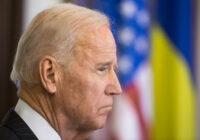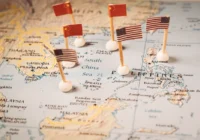By now, you’ve probably heard that Tucker Carlson, recently of Fox News and now of his own independent “network,” interviewed Russian President Vladimir Putin. He published the video on February 8 on Twitter.
If you haven’t taken the time to watch it, I highly recommend that you do. It’s long, breaking two hours, and it is dense. Putin is a man who says one thing and really means five things, and that doesn’t work well in our modern soundbite-and-headline news culture. Still, I urge you to take the time to listen. Putin is not going to convince you of anything — at least I doubt that he will — but I don’t think the point of the interview was to “convince” anyone. In this article, I want to lay out my thoughts on the interview, my thoughts on the wider Russia–Ukraine war and what it really means.
A narrative is just good strategy when you’re playing the game
The title of this present article refers to Swedish video game developer Paradox Interactive. The company has made a name for itself publishing “grand strategy” games with titles like Crusader Kings and Europa Universalis. These are games where the player assumes control of a historical nation, people or dynasty and crafts the narrative and strategy of that nation, people or dynasty throughout history. I believe that this, in essence, is what Putin is doing now. He’s playing the grand narrative and grand strategy of the Rus’ people, and he’s playing to win.
If you’re aware of the video, you’re almost certainly aware of the various “fact checks” on Putin’s historical claims. Some of the more notable fact-checks on Putin’s historical claims come from reputable historians whom I greatly respect, like Tom Holland.
What I think most fact-checkers miss is that it doesn’t matter whether Putin’s historical claims are historically accurate. Putin is not writing a paper, giving a book report or making a slide deck presentation. He has no judge or teacher who will be giving out a grade. You cannot point out enough inconsistencies or inaccuracies or fabrications that will make Putin say “Drat, I’ve been found out” and order his armies to turn back in shame and go home. That’s not the point of Putin’s historical claims. Putin is establishing a narrative.
What do I mean by “narrative”? Quite simply, and quite directly, I mean that Putin is telling a story to himself, to his country and to us about why he has decided to go to war. A narrative is less about the past than it is about the present — it exists not to explain history but to justify policy. For this reason, a narrative is fundamentally incapable of being fact-checked or falsified.
The US has had its own fair share of narratives, most famously Manifest Destiny. Many other narratives have also gripped US theory and shaped global aims. The Monroe Doctrine was an American narrative about why America should be responsible for half the globe. The “Arsenal of Democracy” was a narrative about justifying American entry into World War II. Much more recently, the “Global War on Terror” was an American narrative about justifying our continual involvement across the planet in pursuit of everyone we decide to label “terrorist.” Domestically, “systemic racism” is a narrative we’ve concocted to justify the complete upending and reimaging of everything from major sporting events to college admissions to who gets promotions in order to accomplish ideologues’ visions of justice.
What do all of these narratives have in common? The characteristic that fact-checking them is as useful as fact-checking Star Wars or The Lord of the Rings. Pushing your glasses up your nose and saying, “Actually, sweetie, that didn’t happen,” is both futile and entirely beside the point. You can point out all the historical inaccuracies that went into each of those narratives until the cows come home, but it won’t change a single thing that the people who believed in political narratives actually do. Narratives are supplanted by other narratives, not facts, because only nerds care about dry, disconnected facts — real people like stories.
What is the story Putin is telling?
What is Putin’s narrative — the grand story for his grand strategy?
As near as can be ascertained and summarized, Putin’s narrative is, “We are fighting to unite the long-divided lands of the Rus’.” Rus’ are the the ethnos from which “Rus-sia” derives its name, after all.
I don’t want to recap the entire history of the Rus, you may as well watch the interview for that. I’m sure you’ve seen the memes already about Putin — “I’ll give you the thirty-second history, one minute at most,” and then he talks and talks and talks. Still, the real thirty-second recap is quite easy to grasp.
The Rus’ state started around the area of Kiev as a unification of various tribes under a Norse aristocracy. The Rus’ then converted to eastern Christianity and ultimately splintered into various realms under the suzerainty of the Golden Horde. Eventually, one of the more easterly splinter states, centered on Moscow, rose to prominence. Moscow agglomerated the lands of the Rus’ back together over long centuries and much war only, for it to all fall apart again in 1917 with the Bolsheviks (who Putin does seem to consider devils) and the USSR. The USSR, so the narrative goes, arbitrarily divided the lands of the Rus into constituent republics under Moscow’s overlordship. This then fell apart again in 1991 with the collapse of the Soviet Union. (Despite his loathing of the Bolsheviks, Putin sees this as another disaster.) This brings us to today, with Moscow once again trying to agglomerate the lands of the Rus’ under its overlordship.
Why is it important that Putin considers the divisions of the USSR’s constituent republics “arbitrary”? It’s because part of this narrative is that the Ukrainians are not their own people, but are confused and temporarily embarrassed Russians, even if they don’t know it. More precisely, Putin asserts that the Ukrainians are an artificial union of Russians, Poles, Lithuanians and Hungarians, but he mostly just cares about the Russian ones. Putin does not outright state, but seems to strongly imply, that the Ukrainian people should be shown that they truly are this collection and the sub-ethnicities that make up the Ukraine should return to their ethnic states.
If the Ukrainians are not their own people, but are just confused Russians, then bringing them back into the fold of Russia is a corrective action and not an unjust war. That’s why a compelling narrative is important.
By this point, I’m sure you’re railing not just at historical inaccuracies but at the violation of liberal democratic sensibilities about how states are supposed to act. “How can he just say that they’re not their own people?” I have seen. “That’s ethnic cleansing!” I have also seen. “We just don’t do that anymore,” I have seen again and again. Well, they’re doing it, part of this narratival struggle is that the old, post-1945 order is being deliberately destroyed.
At the risk of comparing apples to oranges, imagine a similar situation in the United States with subnational identities during a hypothetically similar collapse to Russia in 1991. Are you a New Yorker, a Vermonter, a Texan… or are you an American? Am I an Indianan, by my birth, or an Arizonan, by my most long-standing abode, or am I an American first? Does being a New Yorker, a Vermonter, a Texan or an Arizonan mean that the supraethnic American state is not my legitimate sovereign? No, of course not. That’s the narratival argument that Putin is making; that Russia is the supra-Russian sovereign.
How will this narrative play out in Ukraine?
Russia is building a narrative, and that narrative is to justify assertions of political authority and sovereignty. Sovereignty always comes down to force. As Jean V. Dubois, a character from Robert Heinlein’s Starship Troopers, astutely noted, political authority is force, force is violence, and violence is the supreme authority from which all other authorities are derived. If the narrative exists to serve and justify force, then, what political authority does it seem like Russia really wants to assert with its force? In other words, how does Putin plan to have this war end?
I think that, ultimately, Ukraine will be completely partitioned. Russia will annex all the lands east of the Dnieper; it already de facto owns approximately half of those lands. As Ukrainian military strength degrades by the minute, it will no longer have the power to keep the Russians at bay behind an artificial boundary. Only the Dniepr, the most prominent natural boundary in Ukraine, will form a plausible barrier to the Russian advance.
After this, the west of the Ukraine will be divided up between Poland, Hungary and Romania. Sound implausible? Ostensibly, of course, the western partitions will not be annexations, and they will likely be done under a fig leaf of humanitarian aid. Still, they will happen all the same. Kiev might retain some authority in a de facto rump state, a sort of West Berlin-esque enclave, but this would be temporary.
I also see Belarusian accession to Russia itself as very likely. You can’t leave one of the lands of the Rus’ disunited after winning a major war over the very question of uniting the lands of the Rus’, now can you? Already, while Belarus is still nominally independent, it is a vassal of Moscow. Few nations, resurging after a collapse like Soviet Russia suffered in the 1990s, would leave such a large portion of their former territory behind. Watch that space.
Looking further ahead, a by no means inevitable, yet plausible outcome for Russia would be a restoration of the tsarist monarchy, under the Romanovs or otherwise. Putin would have all but restored the Russian Empire after a major victory in Ukraine. Spanish Dictator Francisco Franco did it; although he, not the exiled king, held all of the power, he restored the trappings of monarchy to borrow its legitimacy. Now, Franco is gone, yet Spain is still a kingdom. It’s not without precedent, and it is more doable in Russia than a Westerner might assume. Nostalgia for the monarchy remains surprisingly popular in the Russian Orthodox Church and among Russians generally. Russia already utilizes the imperial ensign, colors and aquila in multiple places that a republic would be embarrassed to do so. Watch this space, too.
So, what’s the conclusion? Russian feelings don’t care about your facts. Putin is stirring great Russian patriotic sentiment to correct perceived historical injustices that they’ve long felt slighted by. Enthusiasm for the war was never very unanimous in the US, and it continues to drop. Once US aid goes fully, there will not be much to stop Russia fully doing what it wills. Will the US get directly involved, starting a nuclear war, over who is sovereign on the Pontic Steppe? I think it very unlikely. Do svidanaya.
[Anton Schauble edited this piece.]
The views expressed in this article are the author’s own and do not necessarily reflect Fair Observer’s editorial policy.
Support Fair Observer
We rely on your support for our independence, diversity and quality.
For more than 10 years, Fair Observer has been free, fair and independent. No billionaire owns us, no advertisers control us. We are a reader-supported nonprofit. Unlike many other publications, we keep our content free for readers regardless of where they live or whether they can afford to pay. We have no paywalls and no ads.
In the post-truth era of fake news, echo chambers and filter bubbles, we publish a plurality of perspectives from around the world. Anyone can publish with us, but everyone goes through a rigorous editorial process. So, you get fact-checked, well-reasoned content instead of noise.
We publish 2,500+ voices from 90+ countries. We also conduct education and training programs
on subjects ranging from digital media and journalism to writing and critical thinking. This
doesn’t come cheap. Servers, editors, trainers and web developers cost
money.
Please consider supporting us on a regular basis as a recurring donor or a
sustaining member.
Will you support FO’s journalism?
We rely on your support for our independence, diversity and quality.











Comment